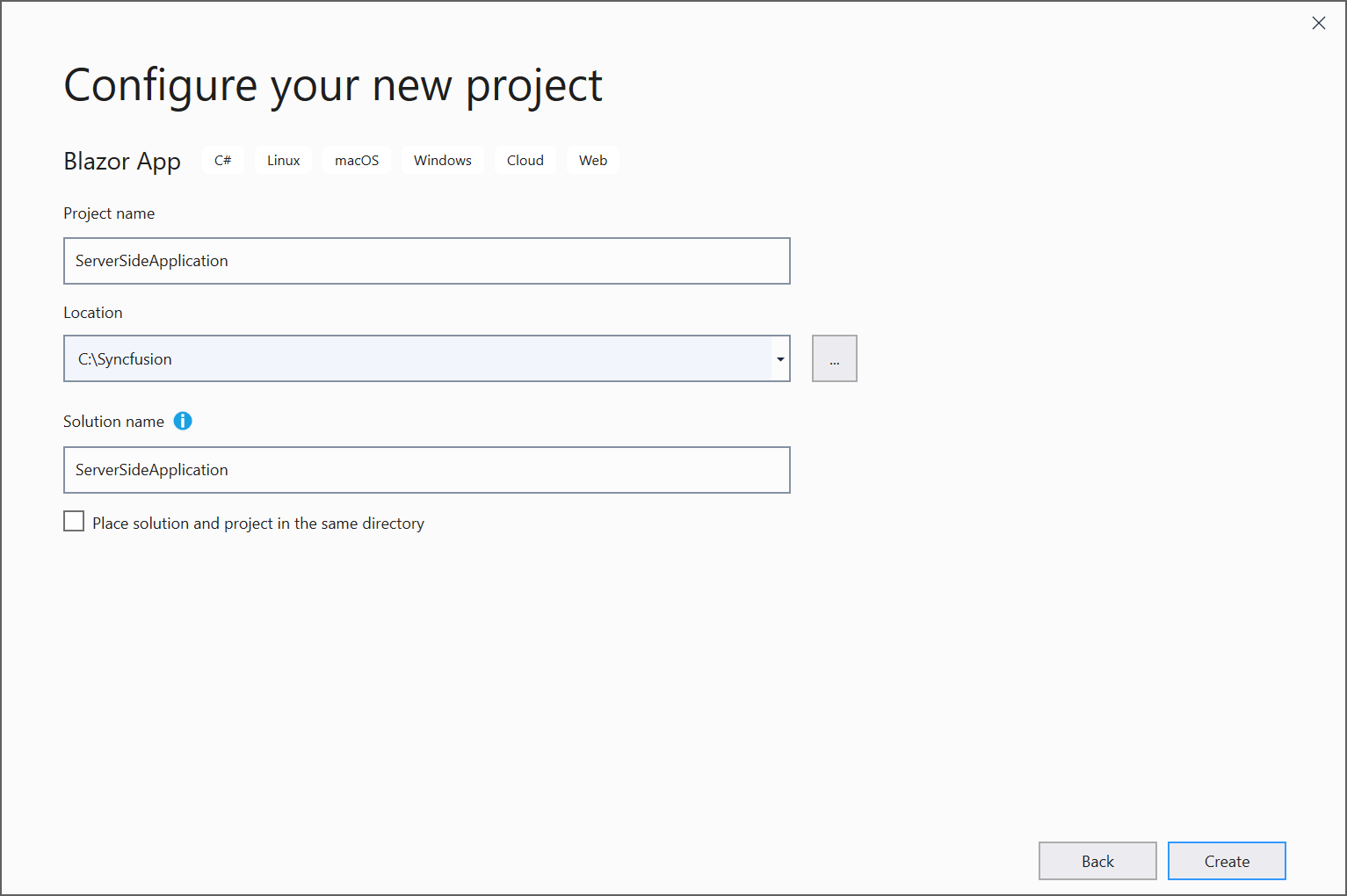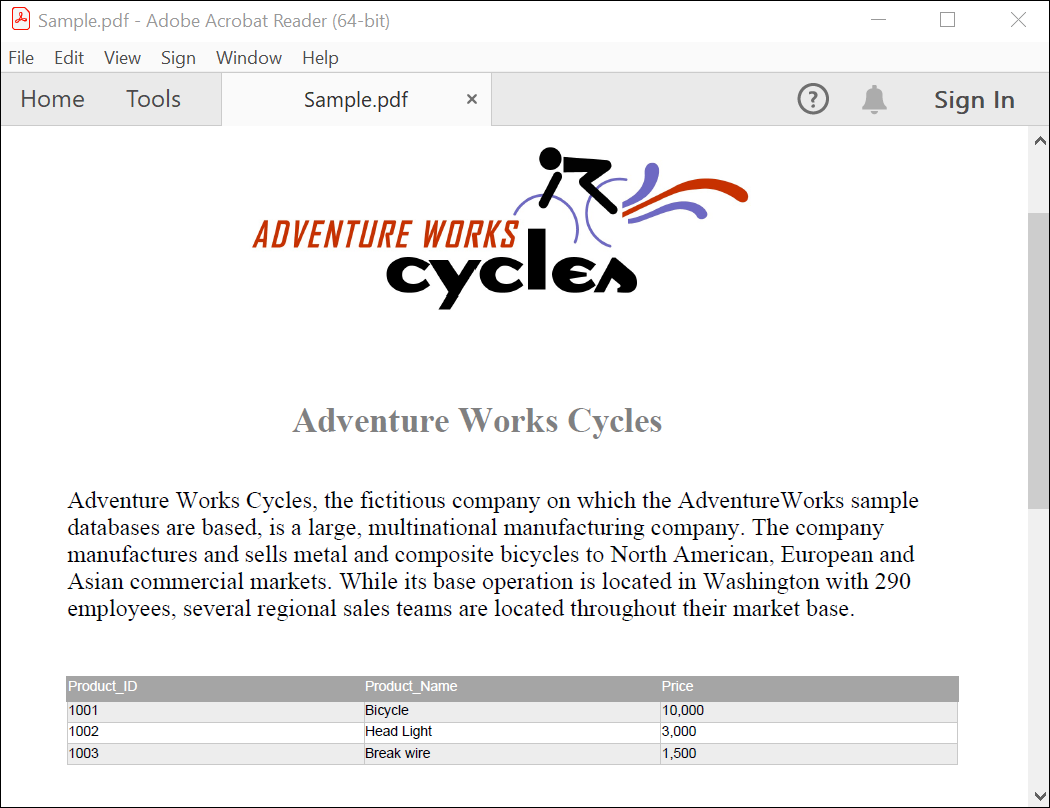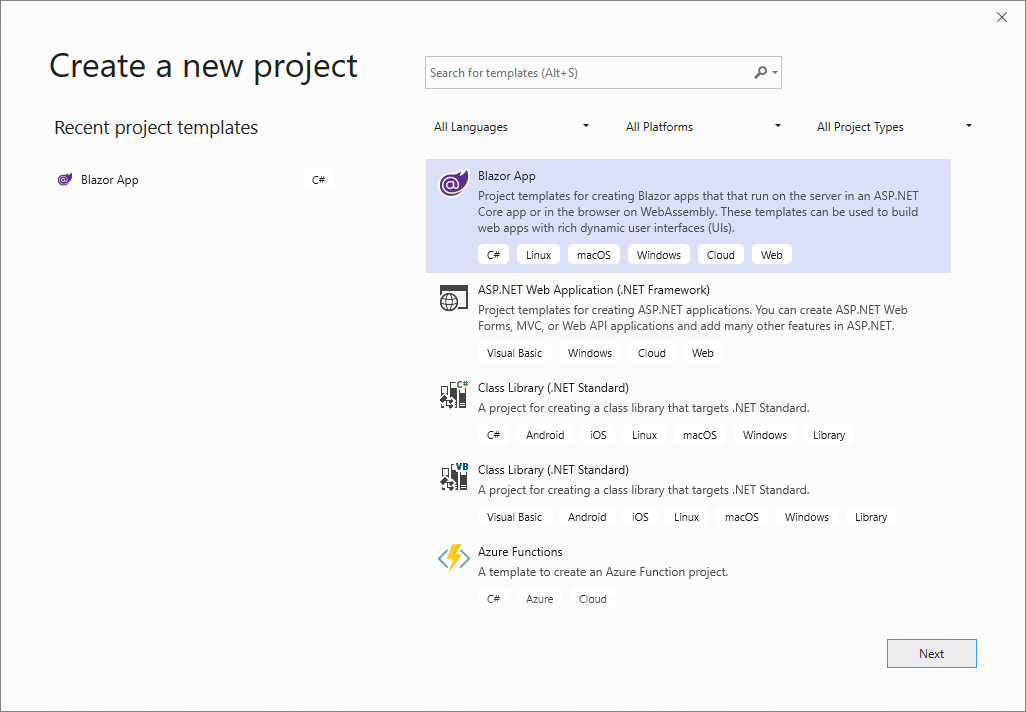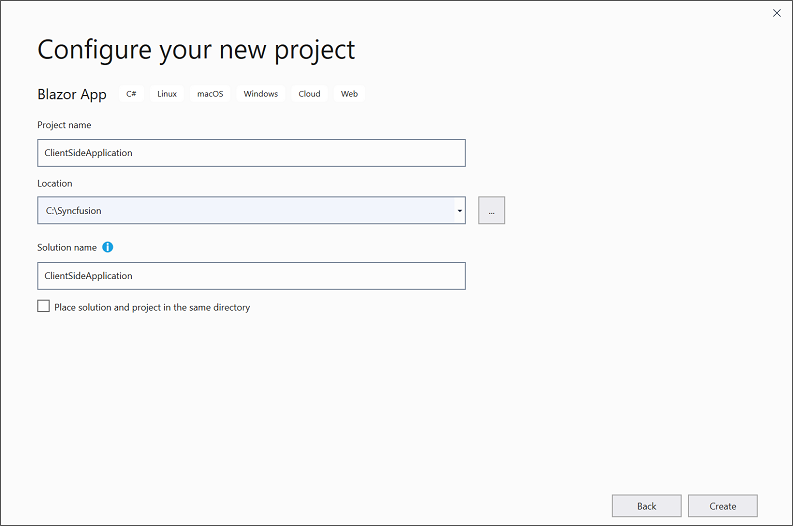Open and save PDF document in Blazor
20 Jan 202514 minutes to read
The Syncfusion® Blazor PDF library is used to create, read, and edit PDF documents programatically without the dependency of Adobe Acrobat. Using this library, you can open and save PDF document in ASP.NET Core.
Prerequisites:
- Visual Studio 2019 Preview
- Install the .NET Core SDK 3.1 Preview
Creating a Blazor project
- Enable Visual Studio to use preview SDKs.
- Open Tools > Options in the menu bar.
- Open the Projects and Solutions node. Open the .NET Core tab.
- Check the box for Use previews of the .NET Core SDK and click OK.
- Restart the Visual Studio 2019.
Server app
Step 1: Create a new C# Blazor Server app project. Select Blazor App from the template and click the Next button.

Step 2: Now, the project configuration window will popup. Click Create button to create a new project with the required project name.

Step 3: Choose Blazor Server App and click Create button to create a new Blazor Server app for .NET Core 3.0.0-preview9.

Step 4: To open and save a PDF document in Blazor Server app, install Syncfusion.Pdf.Net.Core to the Blazor project.

NOTE
Starting with v16.2.0.x, if you reference Syncfusion® assemblies from trial setup or from the NuGet feed, you also have to add “Syncfusion.Licensing” assembly reference and include a license key in your projects. Please refer to this link to know about registering Syncfusion® license key in your application to use our components.
Step 5: Inject ExportService into FetchData.razor using the following code.
@inject ExportService service
@inject Microsoft.JSInterop.IJSRuntime JS
@using System.IOStep 6: Create a button in the FetchData.razor using the following code.
<button class="btn btn-primary" @onclick="@LoadAndSave">Load and save PDF document</button>Step 7: Add the LoadAndSavePDF method in FetchData.razor page to call the export service.
protected async Task LoadAndSave()
{
using (MemoryStream memoryStream = ExportService.LoadAndSavePDF(forecasts))
{
await JS.SaveAs("Sample.pdf", memoryStream.ToArray());
}
}Step 8: Create a new cs file named ExportService under Data folder and include the following namespaces in the file.
using Syncfusion.Pdf;
using Syncfusion.Pdf.Graphics;
using Syncfusion.Pdf.Grid;
using Syncfusion.Drawing;
using Syncfusion.Pdf.Parsing;
using System.IO;Step 9: Register your service in the ConfigureServices method available in the Startup.cs class as follows.
public void ConfigureServices(IServiceCollection services)
{
services.AddRazorPages();
services.AddServerSideBlazor();
services.AddSingleton<WeatherForecastService>();
services.AddSingleton<ExportService>();
}Step 10: Create a new MemoryStream method with name as LoadAndSavePDF in ExportService class and include the following code snippet to open an existing PDF document in Blazor Server app.
public static MemoryStream LoadAndSavePDF()
{
//Open an existing PDF document
FileStream fileStream = new FileStream("Input.pdf", System.IO.FileMode.Open, System.IO.FileAccess.Read);
PdfLoadedDocument document = new PdfLoadedDocument(fileStream);
}Step 11: Add below code example to add a table in PDF document.
//Create a PdfGrid
PdfGrid pdfGrid = new PdfGrid();
//Add values to the list
List<object> data = new List<object>();
Object row1 = new { Product_ID = "1001", Product_Name = "Bicycle", Price = "10,000" };
Object row2 = new { Product_ID = "1002", Product_Name = "Head Light", Price = "3,000" };
Object row3 = new { Product_ID = "1003", Product_Name = "Break wire", Price = "1,500" };
data.Add(row1);
data.Add(row2);
data.Add(row3);
//Add list to IEnumerable
IEnumerable<object> dataTable = data;
//Assign data source
pdfGrid.DataSource = dataTable;
//Apply built-in table style
pdfGrid.ApplyBuiltinStyle(PdfGridBuiltinStyle.GridTable4Accent3);
//Draw the grid to the page of PDF document
pdfGrid.Draw(graphics, new RectangleF(40, 400, loadedPage.Size.Width - 80, 0));Step 12: Add the below code example to save the PDF document in Blazor server application.
//Create memory stream.
using (MemoryStream stream = new MemoryStream())
{
//Saving the PDF document into the stream
document.Save(stream);
//Closing the PDF document
document.Close(true);
}Step 13: Create a class file with FileUtil name and add the following code to invoke the JavaScript action to download the file in the browser.
public static class FileUtil
{
public static ValueTask<object> SaveAs(this IJSRuntime js, string filename, byte[] data)
=> js.InvokeAsync<object>(
"saveAsFile",
filename,
Convert.ToBase64String(data));
}Step 14: Add the following JavaScript function in the _Host.cshtml available under the Pages folder.
<script type="text/javascript">
function saveAsFile(filename, bytesBase64) {
if (navigator.msSaveBlob) {
//Download document in Edge browser
var data = window.atob(bytesBase64);
var bytes = new Uint8Array(data.length);
for (var i = 0; i < data.length; i++) {
bytes[i] = data.charCodeAt(i);
}
var blob = new Blob([bytes.buffer], { type: "application/octet-stream" });
navigator.msSaveBlob(blob, filename);
}
else {
var link = document.createElement('a');
link.download = filename;
link.href = "data:application/octet-stream;base64," + bytesBase64;
document.body.appendChild(link); // Needed for Firefox
link.click();
document.body.removeChild(link);
}
}
</script>You can download a complete working sample from GitHub.
By executing the program, you will get the PDF document as follows.

Click here to explore the rich set of Syncfusion® PDF library features.
WASM app
Step 1: Create a new C# Blazor WASM app project. Select Blazor App from the template and click the Next button.

Step 2: Now, the project configuration window appears. Click Create button to create a new project with the default project configuration.

Step 3: Blazor WebAssembly App from the dashboard and click Create button to create a new Blazor client-side application.

Step 4: Install the Syncfusion.PDF.Net.Core NuGet package as a reference to your Blazor application from NuGet.org.

Step 5: Next, include the following namespaces in that FetchData.razor file.
@using Syncfusion.Pdf
@using Syncfusion.Pdf.Grid
@using Syncfusion.Pdf.Graphics
@using Syncfusion.Drawing
@using Syncfusion.Pdf.ParsingStep 6: Create a button in the FetchData.razor using the following code.
<button class="btn btn-primary" @onclick="@LoadAndSavePDF">Export to PDF</button>Step 7: Create a new async method with name as LoadAndSavePDF and include the following code snippet to open an existing PDF document in Blazor WASM app.
@functions {
public async void LoadAndSavePDF()
{
//Load an existing PDF document.
PdfLoadedDocument document = new PdfLoadedDocument(inputstream);
}
}Step 8: Add the below code example to add table in the PDF document.
//Create a PdfGrid
PdfGrid pdfGrid = new PdfGrid();
//Add values to the list
List<object> data = new List<object>();
Object row1 = new { Product_ID = "1001", Product_Name = "Bicycle", Price = "10,000" };
Object row2 = new { Product_ID = "1002", Product_Name = "Head Light", Price = "3,000" };
Object row3 = new { Product_ID = "1003", Product_Name = "Break wire", Price = "1,500" };
data.Add(row1);
data.Add(row2);
data.Add(row3);
//Add list to IEnumerable
IEnumerable<object> dataTable = data;
//Assign data source
pdfGrid.DataSource = dataTable;
//Apply built-in table style
pdfGrid.ApplyBuiltinStyle(PdfGridBuiltinStyle.GridTable4Accent3);
//Draw the grid to the page of PDF document
pdfGrid.Draw(graphics, new RectangleF(40, 400, loadedPage.Size.Width - 80, 0));Step 9: Add below code example to save the PDF document in Blazor.
//Save the PDF document.
MemoryStream memoryStream = new MemoryStream();
document.Save(memoryStream);
//Close the document.
document.Close();
//Download the PDF document
await JS.SaveAs("Sample.pdf", memoryStream.ToArray());Step 10: Create a class file with FileUtil name and add the following code to invoke the JavaScript action to download the file in the browser.
public static class FileUtil
{
public static ValueTask<object> SaveAs(this IJSRuntime js, string filename, byte[] data)
=> js.InvokeAsync<object>(
"saveAsFile",
filename,
Convert.ToBase64String(data));
}Step 11: Add the following JavaScript function in the index.html available under the wwwroot folder.
<script type="text/javascript">
function saveAsFile(filename, bytesBase64) {
if (navigator.msSaveBlob) {
//Download document in Edge browser
var data = window.atob(bytesBase64);
var bytes = new Uint8Array(data.length);
for (var i = 0; i < data.length; i++) {
bytes[i] = data.charCodeAt(i);
}
var blob = new Blob([bytes.buffer], { type: "application/octet-stream" });
navigator.msSaveBlob(blob, filename);
}
else {
var link = document.createElement('a');
link.download = filename;
link.href = "data:application/octet-stream;base64," + bytesBase64;
document.body.appendChild(link); // Needed for Firefox
link.click();
document.body.removeChild(link);
}
}
</script>You can download a complete working sample from GitHub.
By executing the program, you will get the PDF document as follows.

NOTE
Even though PDF library works in WASM app, it is recommended to use server deployment. Since the WASM app deployment increases the application payload size.
Kindly explore the supported and unsupported features of PDF library in Blazor.
Click here to explore the rich set of Syncfusion® PDF library features.